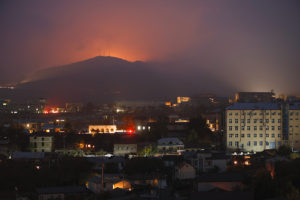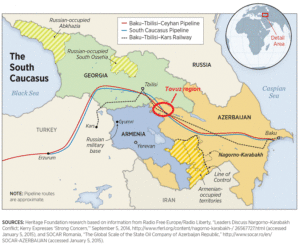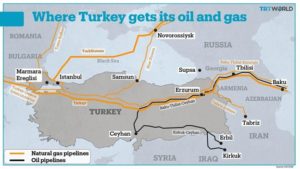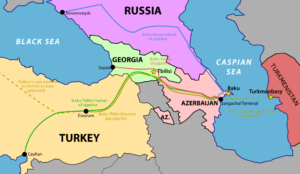Armenian and Azerbaijani forces are fighting fierce battles for control over the disputed Nagorno-Karabakh region – a mountainous patch of land that is internationally recognized as part of Azerbaijan, but de facto controlled by ethnic Armenians who refer to the territory as the Republic of Artsakh. The coming weeks could mark a turning point in the conflict that erupted on September 27 and resulted in the deaths of thousands of troops and civilians on both sides. The conflict is being carefully watched for two reasons: 1) its potential to spread beyond its borders, and 2) an underlying energy war between Russia, the US, and the European Union. (See maps below).
According to reports, the Azerbaijani Army captured the entire area along the border with Iran and already controls certain sections of the Lachin corridor, which is seen as a key supply line for the Armenians. It is the major link between Armenia and Artsakh. Without this road, Armenia’s main artery to Nagorno-Karabakh will be cut off. This will pave the way for the Azeri troops to capture Stepanakert, the region’s capital. The situation is critical for the Armenian forces, which is why most residents already fled the city. Given that the Azeris reportedly captured the strategically important town of Shushi, it is a matter of time before their troops reach the outskirts of Stepanakert.0

“As they say, whoever controls Shushi, controls Artsakh”, said Haroutyunyan, calling his compatriots to directly participate in the defense of the town.
Armenia’s Prime Minister Nikol Pashinyan accused Turkey of intervening militarily on behalf of Azerbaijan, telling a reporter for Time magazine that President Recep Tayyip Erdogan is vying to extend his influence in the region.
On the other hand, Azerbaijan’s President Ilham Aliyev repeated on several occasions that his country will not cease military action until Armenian forces withdraw from the enclave of Nagorno-Karabakh and surrounding Azeri territories.
“Azerbaijan has one condition, and that is the liberation of its territories. Nagorno-Karabakh is the territory of Azerbaijan. We must return and we shall return,” said Aliyev.
In spite of such rhetoric, the two sides agreed to a “humanitarian” ceasefire three times, but it was never implemented on the ground. Instead, backed by Turkey, the Azerbaijani Armed Forces made significant gains over the past few weeks. The Azeri leaders are quite aware that a truce would a have negative impact on their military offensive, since it would give the Armenian forces a chance to regroup and consolidate. The Armenians, on the other hand, desperately need a break, as they are on the verge of defeat.
There are reports that the two sides are close to reaching a deal over the future of the region, although the information published by Turkish sources has never been officially confirmed. Apparently, the draft deal will force Armenians to withdraw from some areas following the deployment of a Turkish and Russian peacekeeping force. Also, Armenia and Azerbaijan will agree to establish two corridors: a road leading from Armenia to Nagorno-Karabakh, and a second corridor connecting the Azerbaijan’ exclave Nakhcivan to the Azeri mainland. From the Armenian perspective, however, such a deal looks unacceptable; an inevitable Armenian defeat in Nagorno-Karabakh could put Yerevan in an inferior position, which means that Armenia would have to make some painful concessions to Azerbaijan.
Nagorno-Karabakh has been under Armenian control for the past 26 years. The two countries fought a war between 1988 and 1994, which resulted in victory for Yerevan, the capital of Armenia. However, Baku, the capital of Azerbaijan, never accepted the status quo on the ground, but was actively preparing for another round of confrontation with its archenemy. Over the years, Azerbaijan reportedly bought large amounts of modern, sophisticated weapons, primarily from Turkey, the U.S. and Israel, but also from Russia, which is seen as Armenia’s ally. Indeed, Russia is obliged to defend Armenia – a member of the Moscow-led Collective Security Treaty Organization (CSTO) – but the Kremlin leaders pointed out that such an action will take place only in case the Caucasus nation gets attacked by any state or group of states. In other words, as long as the hostilities are localized in Nagorno-Karabakh, Russia will not intervene. That is why Baku carefully avoided shelling Armenia’s territory, even though Armenia’s military said it shot down four drones flying near the country’s capital on October 1. On the other hand, Armenian forces reportedly fired ballistic missiles on Azerbaijan’s cities several times, destroying mostly civilian infrastructure.
It is worth noting, however, that the Armenians carefully avoided targeting Azerbaijan’s energy infrastructure including two pipelines that carry natural gas and crude oil from the Caspian Sea through Georgia to Turkey, even though attacking the pipelines would undoubtedly create serious problems for Baku. The two pipelines (see map) are located directly north of the Nagorno-Karabakh conflict.

Armenia’s restraint may be borne out of its leaders’ fear of Azerbaijan’s fiercest protector, Turkey, which the Armenians have long denounced as the perpetrator of genocide against their people during World War I. Last month, Armenians claimed that Azeri forces beheaded an Armenian soldier, reviving forebodings of genocide. The Armenians, themselves Christians, have long looked to Christian Russia as their defenders.
The Energy Dimension

Turkey, which has played the most visible role in escalating the conflict by sending arms to Azerbaijan and recruiting former Syrian opposition forces to fight against the Armenians, has long envisioned itself as a major energy corridor between East and West. For this reason, Turkey’s Prime Minister Erdogan has played “pipeline politics” with both East and West, beginning with his negotiating with the US a major pipeline deal signed to blunt Russia’s monopoly of being the largest supplier of oil and gas to Europe. In 2005, Turkey hailed the Western-financed construction of the Baku Tbilisi- Ceyhan (BTC) pipeline carrying oil from the Caspian Sea to Turkey (deliberately bypassing Russia). A year later, he approved the construction of a parallel South Caucusus gas pipeline from the Caspian Sea to Turkey Yet In 2005, Erdogan also approved the construction of the Blue Stream pipeline from Russia under the Black Sea to Turkey, and in 2016-18 negotiated with the Russians a second. pipeline, the Turkstream pipeline, under the Black Sea to Turkey. Now Turkey aims to reduce its dependence on Russian energy and that is why Azerbaijan is, for Ankara, its most important partner in the Caucasus.
For Russia, both Armenia and the Donbass region in eastern Ukraine have a huge energy importance. Although Armenia, unlike coal-rich Donbass, does not have any significant natural resources, it lies very close to the BTC/ South Caucusus energy corridor. As long as there are hostilities between Azerbaijan and Armenia, the flow of gas and oil supplies from Baku to Europe remains threatened. Additionally, Moscow has long been opposed to the the planned construction of yet another Western-backed pipeline, the Trans-Caspian pipeline(TCP) which would run from Turkmenistan under the Caspian Sea to Baku.

This newest, Western-backed project would bypass the Russian Federation and undermine the country’s influence in the Caucasus, as well as compete with Russia’s supply of natural gas to Europe. In 2018, energy security analyst Richard Stokes wrote a report on “what can be done to realize the Trans Caspian Pipeline project in spite of Russia and Iran’s disproportionate counter efforts.” The TCP, he noted, “could carry Turkmen gas to Europe with a joint pipeline though Azerbaijan, Nagorno-Karabakh, Armenia, Nakhchivan and Turkey as a pipeline for peace regarding the Nagarno-Karabakh conflict.” By getting Armenia to support the TCP, he posited, this would “leave Russia alone.” Seen in this light, Russia’s military support for Armenia in 2020 could also be viewed as a way to obstruct the TPC pipeline project.
Recently, Armenian Prime Minister Nikol Pashinyan requested urgent talks with Russia’s President Vladimir Putin over Russia’s security assistance to Armenia. Given that Russia is trying to preserve the role of a regional arbiter, and also keeps selling weapons to both parties involved in this conflict, it is not likely that the Kremlin will militarily intervene in Nagorno-Karabakh. Eventually, Russia could deploy its troops to the Armenia – Azerbaijan border in order to prevent the spillover of the hostilities to Armenian territory, but such an action will not prevent Baku from capturing Artsakh. Moreover, once the conflict in the Caucasus is over, Armenians might feel betrayed if the Russians did not intervene sufficiently on their behalf. Their leadership could start turning to the West, as hoped for by Richard Stokes, gradually breaking ties with Moscow. At the same time, Ukraine could follow Azerbaijan’s example and attempt to capture the Donbass Republic, which asserted its independence in 2014, from pro-Russia forces. Without open and prompt Russian support – which seems unlikely, since it would result in more anti-Russia sanctions – the self-proclaimed Donetsk People’s Republic and Lugansk People’s Republic, formally still part of Ukraine but de facto unrecognized states, could be defeated by Ukrainian armed forces in a matter of weeks.
For Moscow, an Armenian defeat would be a severe blow to Russia’s energy and political dominance in the region. At the same time, it would strengthen Turkey’s position in the Caucasus, and would prepare the ground for the remaining frozen conflicts in the post-Soviet space – primarily the Donbass, Moldova’s breakaway region of Transnistria bordering western Ukraine and potentially Crimea – to turn into hot wars.
Nikola Mikovic is a contributor to CGTN, Global Comment, Byline Times, Informed Comment, World Geostrategic Insights
.
